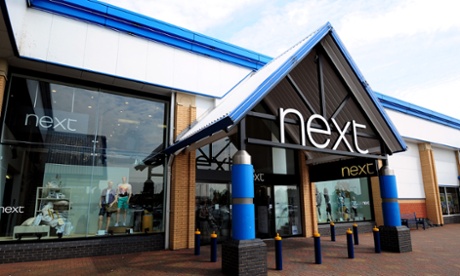
It will take time for improvements in the economy to filter through to the High Street, the chief executive of fashion chain Next warned yesterday, in a cautious assessment on the outlook for this year which sent the high-flying shares down 4%.
Lord Wolfson - who is also a Tory peer and an economic adviser to Chancellor George Osborne - said all the economic indicators looked good, but they would not be immediately reflected in buoyant high street trade.
“All the indicators look good to us, “he said, “on wages, inflation, employment, all the key variables that affect the amount of money people have to spend. I don’t think there is an issue with the economy.
“Real incomes going up is good for retail. But it may not be good immediately. It’s difficult at this point to say where people are going to spend.”
The retailer was the FTSE 100’s biggest faller, even though it reported sales of more than £4bn for the first time and delivered profits in line with expectations.
Wolfson predicted that Next’s sales would rise by between 1.5% and 5.5% in the year ahead, compared to about 7% last year. Growth would be harder to achieve, he said, because this year’s performance was set against a very strong period of trading early last year when sales were boosted by a warm spring and popular collections.
“We are now to back to a more normal situation. The vast majority of our ranges we are really happy with but we are not as happy as last year when we were over-performing.”
Wolfson admitted that growth at Next’s home delivery service was slowing and its fashion collections were not as strong as last year. Wolfson said Next was facing increasing online competition from rival fashion retailers who have improved their websites and delivery services dramatically in recent years . “We started a long way out in front and I always said other people would catch up. It won’t necessarily mean sales move backwards but our opportunities for growth will be constrained,” he said.
Analysts said sales at the main Next Directory catalogue and website, which have driven growth over the past few years, are likely to rise by just £10m this year, compared to about £81m last year .
Wolfson said the majority of sales growth in the year ahead was likely to come from expanding Next’s online business overseas and from its new Label website, which sells brands including Whistles, Joules,Adidas and Converse.
Tony Shiret, an analyst at BESI, said there were early signs that Next Directory in the UK was reaching “maturity” where it would find growth increasingly tough. “We believe that we are seeing a structural slowdown in Next’s main growth engine,” he said.
Given the challenges facing Next, Wolfson said that prospective shareholder returns for the year ahead would be “very respectable by most standards” but low compared with Next’s historical performance. He predicted pre-tax profits would rise by between just 0.4% and 6.7% in the year ahead compared to 14% in the year to the end of January, when they hit £795m.
Nick Bubb, an independent retail analyst, described Wolfson’s cautious outlook as the “sting in the tail” of the company’s results, which came out at the top end of expectations.
Sales at Next rose 7.2% to just over £4bn in the year to the end of January.
Next’s high street rival Marks and Spencer’s is only slightly ahead in clothing sales - at £4.1bn last year- but M&S is far less profitable.
Despite its cautious expectations for the future, Next will open a further 350,000sq ft of space in the year ahead, the same as last year. It is opening more department store style outlets out of town and extending existing outlets to combine clothing and homewares. Wolfson said he had taken a look at BHS’s portfolio of stores, some of which have recently been put on the market and could be interested in “one or two.”
”

